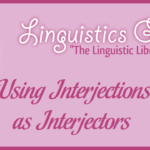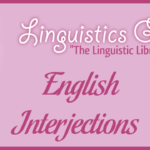The modal verb is a distinct auxiliary verb form characteristic of the English language that differs from prototypical verbs in grammatical form and grammatical function. In addition to the nine full modal verbs, the English language has five quasi-modal verbs:
- ought (to)
- had better/best
- used to
- dare
- need
Quasi-modal verbs are a subset of modal verbs that possess some but not all grammatical properties of prototypical modals. The term semi-modal verb also refers to quasi-modal verbs.
Grammar of Quasi-modal Verbs
Unlike prototypical English verbs, modal verbs including quasi-modal verbs are defective and neutral. Verbal defectiveness refers to a lack of nonfinite forms, and verbal neutralization refers to the lack of a separate third person singular simple present form. For example:
- I ought to wash the windows.
- He ought to wash the windows.
- I had better double check.
- She had better double check.
- I used to jog in the morning.
- He used to jog in the morning.
- Dare I ask?
- Dare she ask?
- You need not yell.
- She need not yell.
Quasi-modals lack tensed (past, present) and nontensed (infinitive, present participle, past participle) forms. For example:
- Base – Infinitive – Present Tense – Past Tense – Present Participle – Past Participle
- eat – to eat – eat, eats – ate – eating – eaten
- could – *to could – could, *coulds – *coulded – *coulding – *coulden
- ought to – *to ought to – ought to, *oughts to – *oughted to – *oughting to – *oughten to
Quasi-modal verbs also do not reflect grammatical number. For example:
- You need to study for the test.
- He needs to study for the test.
- You should study for the test.
- He should study for the test.
- *He shoulds study for the test.
- You ought to study for the test.
- He ought to study for the test.
- *He oughts to study for the test.
However, quasi-modal verbs do slightly differ grammatically from full modal verbs. Dare and need morphologically resemble full modal verbs within negated verb phrases but not positive verb phrases. For example:
- He dare not ask.
- You need not grumble.
- *He dare ask.
- *You need grumble.
- He dares to ask.
- You need to grumble.
In the case of positive verb phrases, English grammar requires the catenative verbs dare (to) and need (to) rather than the quasi-modal verbs dare and need. However, quasi-modal dare and need do syntactically resemble full modal verbs within subject-verb inversion of the verb phrase of interrogative sentences. For example:
- Need you bother?
- Dare I complain?
Form of Quasi-modal Verbs
Quasi-modal verbs also differ slightly in form from prototypical modal verbs. As previously mentioned, quasi-modal dare and need resemble full modal verbs as single word verbs in form, but only within negated verb phrases and within subject-verb inversion of the verb phrase of interrogative sentences. English lacks quasi-modal dare and need within positive verb phrases and non-inverted verb phrases.
Quasi-modal ought also resembles a full modal verb within subject-verb inversion as in Ought she ask her mother first? but not non-inverted verb phrases as in She ought to ask her mother first.
Additionally, the quasi-modal verbs ought (to) and used to appear to resemble catenative verbs in grammatical form. A catenative verb is a verb that forms a string of verbs by linking the catenative verb to an infinitive, present participle, or base form of another verb. Examples of catenative verbs include (obligatory) have, intend, plan, and want. For example:
- I have to attend the party.
- He intends to call on Monday.
- We plan to travel to New England.
- You want to buy a new car.
However, within verb phrases containing catenative verbs, the p-word to functions as an infinitive marker of the verb phrase following the catenative verb. Within quasi-modal constructions, the p-word to functions as a particle.
Function of Quasi-modal Verbs
Unlike prototypical English verbs but like full modal verbs, quasi-modal verbs perform only one grammatical function: modal. Modals in English grammar are words that express modality. Modality is the grammaticalized expression of the subjective attitudes and opinions of the speaker including possibility, probability, necessity, obligation, permissibility, ability, desire, and contingency.
Position of Quasi-modal Verbs
Also like full modal verbs, quasi-modal verbs always appear in the initial position at the beginning of a verb phrase functioning as a predicate. The eight possible English verb phrase combinations that contain quasi-modal verbs are:
- quasi-modal + base = ought to go
- quasi-modal + (be + present participle) = ought to be going
- quasi-modal + (have + past participle) = ought to have gone
- quasi-modal + (have + been + present participle) = ought to have been going
- quasi-modal + (be + past participle) = ought to be cleaned
- quasi-modal + (be + being + past participle) = ought to be being cleaned
- quasi-modal + (have + been + past participle) = ought to have been cleaned
- quasi-modal + (have + been + being + past participle) = ought to have been being cleaned
Not all quasi-modal verbs may appear in all eight positions. Some quasi-modal verbs (ought, dare, need) may only appear within negated verb phrases and within subject-verb inversion of the verb phrase of interrogative sentences.
Additionally, prescriptive grammars proscribe combinations of two or more modals and/or quasi-modals. However, multiple modals are a feature of some Englishes such as South Midland American English, Southern United States English, Appalachian English, Gullah English, Utahan English, African American English, Scottish English, Northern Irish English, some British Englishes, and some Caribbean Englishes.
Quasi-modal verbs are a subcategory of modal verbs that possess some but not all grammatical properties of prototypical modals. The five quasi-modal verbs in the English language are ought (to), had better/best, used to, dare, and need.
References
Bybee, Joan. 2010. Language, usage and cognition. Cambridge: Cambridge University Press.
Feagin, Crawford. 1979. Variation and change in Alabama English: A sociolinguistic study of the white community. Washington: Georgetown University Press.
Huddleston, Rodney. 1984. Introduction to the grammar of English. Cambridge: Cambridge University Press.
Mashburn, Carolyn. 1989. Multiple modals in an American English dialect. CUNY Forum 14. 130-133.
Mishoe, Margaret & Michael Montgomery. 1994. The pragmatics of multiple modal variation in North and South Carolina. American Speech 69(1). 3-29.
Nagle, Stephen J. 1989. Quasi-modals, marginal modals, and the diachrony of the English modal auxiliaries. Folia Linguistica Historica 9(2). 93-104.



